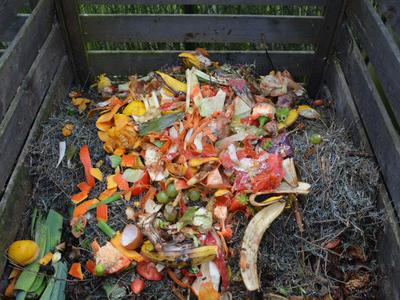Guide to Composting
by James
(UK)
Composting is an ideal way to transform food waste into something useful and beneficial. Peelings and leftovers typically end up in the trash and make their way to the local landfill where they benefit no one. If you create or purchase a compost bin and start recycling food waste into compost at home you will not only benefit your home garden, but also the environment.
Everyone creates food waste, so instead of tossing vegetable and fruit peels (plus a lot of other food items) into the trash use this guide to composting recycle un-eaten food into nutrient-rich compost.
What Is Compost?
Compost is decomposed food and plant matter. When organic matter decomposes it creates a nutrient-rich product that will feed the soil so it can feed plant life.
Gardeners often call compost ‘black gold’ because the fully decomposed organic matter is black and worth its weight in gold as organic plant food. Even though compost is created when food and organic matter decomposes, the finished product is odor-free, dry and crumbly.
Feeds The Soil
Compost contains necessary plant nutrients and is the only food you will need to use in the garden. It contains macronutrients and micronutrients that promote microbial activity in the soil that benefits both plant life and the soil. Compost releases nutrients slowly so an application of it in the garden will feed the soil for months. Compost neutralizers both acid and alkaline soil, which brings pH levels to the ideal range so plants can uptake nutrients more readily.
Improves Soil Structure
Compost can transform any soil type into fertile soil capable of sustaining plant life. Heavy clay soil can be loosened, sandy soil can be made to retain water, barren soil can be made fertile, and good soil can be made better with an application of compost. Compost helps soil retain moisture while promoting good drainage, prevents compaction and prevents erosion.
Benefits The Environment
Having a compost bin at home keeps recyclable organic matter out of the trash and reduces methane emissions, so that’s a plus for the environment but it does much more.
By using organic compost in the flower or vegetable garden you help keep chemicals out of the soil and local water sources. Anything that is put onto the soil will get washed into nearby waterways and ultimately returned into your home via tap water.
Compost won’t do any harm to the soil, streams, and rivers nor the wildlife that live in them. Chemical pollution is reduced and the environment benefited from the use of compost as plant food and soil enhancer.
Compost Bin or Pile?
Compost bins can be purchased in many sizes and styles that range from counter-top models to a series of bins housing differing degrees of decomposing material.
A compost pile can be as simple as a pile of leaves and food scraps in the corner of your backyard. The point is to have a dedicated receptacle or outdoor location to place all of your organic waste material.
Compost bins make the decomposing matter easy to turn while a compost pile will have to be turned manually with a pitchfork.
Common Questions
Should my compost bin have a lid?
It’s not necessary but a lid will help to regulate both the temperature and the moisture levels. A lid will also keep wildlife out of decomposing material.
How often should I turn my compost?
Turning the decomposing matter is not something that has to be done often, but should be done weekly. Decomposition happens because of microbes and they must have oxygen to live and function. Turning the decomposing matter increases the oxygen level in the compost. If there is no oxygen, these microbes die off and decomposition slows down
How long does it take for leaves to turn into compost?
About 1 year. Leaves don’t contain the nitrogen necessary to decompose rapidly but the time can shorten to a few months if you shred them with a lawnmower before adding them to your compost bin or pile.
Does a compost bin smell?
It should not smell if turned regularly. If it starts stinking, add some brown material (leaves, newspaper, straw) and turn the pile.
Do you need to add water to the compost bin?
Only if becomes dry. The decomposing matter should be like a wrung-out sponge for best results.
Can I put moldy food in compost?
Yes. Any organic matter except meat, bones, or cooking oil can be added to the compost bin.
Lawn Mower Hut reviews the latest mowers as well as other garden machinery to help gardeners make more informed buying decisions. They also provide detailed guides on a range of gardening topics.













